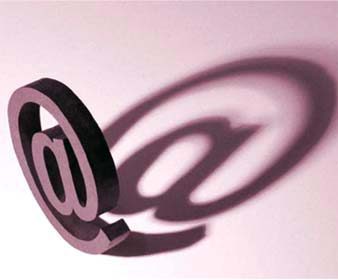Self-destructing e-mail addresses
 Hamburg - Lucky is the e-mail user who hasn't received solicitations for aphrodisiacs or online casinos - commonly known as spam. The single best way to avoid unwanted e-mails is to avoid giving out your e-mail address in the first place. That's easier said than done, however, especially since many online shopping transactions require an e-mail address.
Hamburg - Lucky is the e-mail user who hasn't received solicitations for aphrodisiacs or online casinos - commonly known as spam. The single best way to avoid unwanted e-mails is to avoid giving out your e-mail address in the first place. That's easier said than done, however, especially since many online shopping transactions require an e-mail address.
One potential alternative are disposable e-mail addresses. As these are automatically deactivated after a short time, users can reveal them without worrying about increasing their spam load.
From a purely legal point of view, taking such extraordinary measures should be unnecessary, since online shops are forbidden from sharing e-mail addresses without the permission of the user. Not even a newsletter can be sent without consent.
Reality is hardly so neat, however. "If everything ran as the law dictates, then I'd have no worries," says Wolfgang Holst, a staff member at the State Office for Privacy Protection from Lower Saxony in Hannover, Germany.
Anyone who provides his or her own e-mail address runs the risk of having spam sent to his address or having the address passed onto third parties. Temporary e-mail addresses are available in various forms. Spamgourmet and Mailexpire each give out a temporary address that is linked to the user's permanent address. The services then forward messages to that real address through the temporary one for a set period, after which the temporary address is deleted.
Trash-mail takes a different approach, with no pre-registration required.
"Easy as it is to use trash-mail, there's a risk to using the service, namely that other users could guess the address," says Jo Bager from Hanover-based c't magazine. The magazine has made successful attempts to view e-mail messages from other users, including e-mails with confidential login information for online services. For this reason Bager advises against using trash-mail for sensitive information.
"You should also come up with an e-mail address of at least 10 characters, something that cannot be guessed," Bager says.
The Chaos Computer Club (CCC) also offers a simple throwaway mail service at https://anonbox. net/index. de. html. Here too users are not required to register an account. Even so, the danger of having an address guessed is low, since an address is composed of a letter/number combination.
"Our service is absolutely anonymous. It can also be used for things like remaining anonymous when sending e-mails," says CCC's Constanze Kurz.
Throwaway e-mail addresses are only good for certain situations, though.
"These addresses are only valid for a specific amount of time. That means you should only use them if you aren't not expecting ongoing e-mails," recommends Jo Bager from c't. That can include orders from online shops where an order confirmation needs to be sent. Another potential use is for new and unknown services which have not yet earned your full trust. If, however, you are expecting recurring messages from bidders on an auction you've posted, then you should also enter your real e-mail address during registration.
Another problem occurs when some online shops or portals try to prevent the use of throwaway addresses. "They are not accepted in some cases," says CCC spokeswoman Kurz. Experts recommend thinking through whether providing an e-mail addresses is really necessary.
"You probably shouldn't be entering your telephone number and e-mail address for sweepstakes at all," recommends Holst, the privacy expert.
CCC spokeswoman Kurz also expresses amazement at how carelessly many people treat their personal data. "People complain all the time about spam. And yet if you ask them, it turns out they provide their e-mail address to anyone who asks," Kurz says. Jo Bager sees this as part of a larger issue: "You should never surf the Internet without your brain turned on," Bager quips.
INFO BOX: Spam once again resurgent
Unwanted e-mail messages are coming faster than ever and 27 of 28 e-mails sent on the internet are spam, according to an analysis by security software maker Sophos. In the second quarter of this year, spam made up 96.5 per cent of commercial e-mail messages. That's an increase from the 92.3 per cent in the first quarter. By far the greatest source of spam e-mail is the United States, followed by Russia, Turkey and China. (dpa)